Key takeaways:
- Building relationships with bookstores requires effective communication, shared goals, and community engagement.
- Identifying ideal partners hinges on shared values, community involvement, and a compatible audience.
- Creating proposals should emphasize mutual benefits and adaptability to changing circumstances.
- Success in partnerships is measured by both qualitative engagement and quantitative goals, fostering deeper connections.
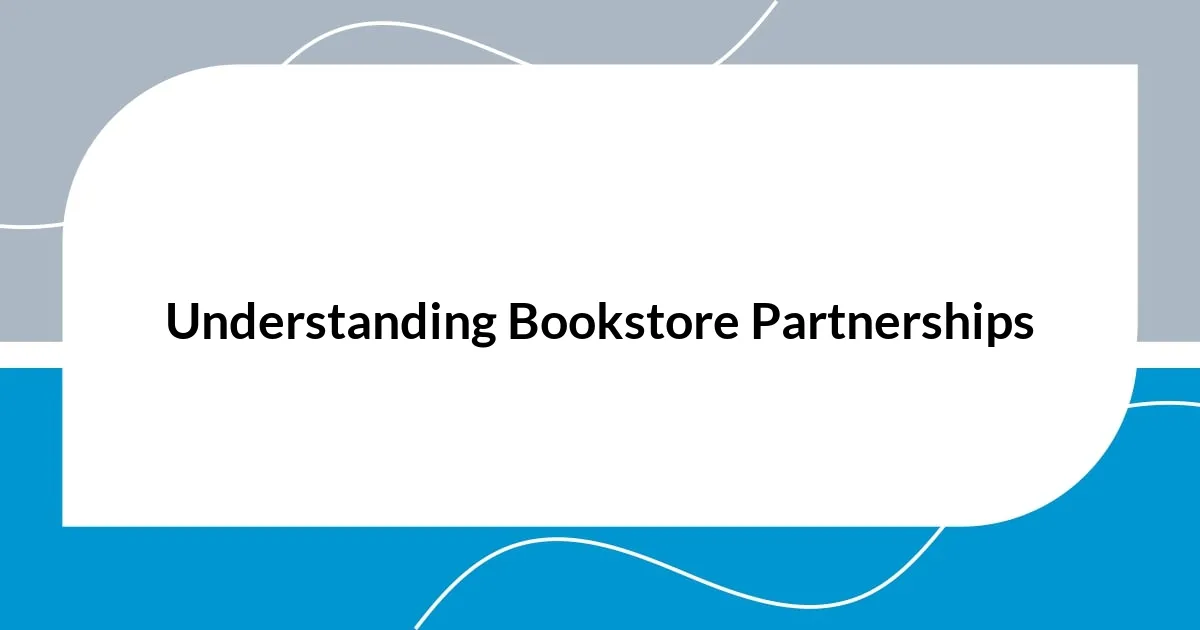
Understanding Bookstore Partnerships
Bookstore partnerships can be pivotal to a successful business strategy, allowing for shared resources and audiences. I remember the thrill of my first collaboration with a local bookstore—co-hosting an author signing event. The excitement in the air was palpable, and it dawned on me how these partnerships can create a vibrant community atmosphere, drawing in not just book lovers but also curious newcomers.
Building relationships with bookstores can feels like nurturing a friendship. When I approached my local bookstore to feature my work, I didn’t just see it as a placement; I envisioned it as a partnership that would allow us both to grow. Isn’t it fascinating how a simple discussion over a cup of coffee could lead to such rich opportunities? In my experience, effective communication and mutual respect form the cornerstone of successful collaborations.
It’s essential to align your marketing goals with a bookstore’s vision. I once collaborated on a themed reading night that resonated with the community, doubling foot traffic for both of us. What if you could create experiences together that not only boost sales but also enrich the reader’s journey? That’s the beauty of bookstore partnerships; they offer a unique platform for creativity and connection.
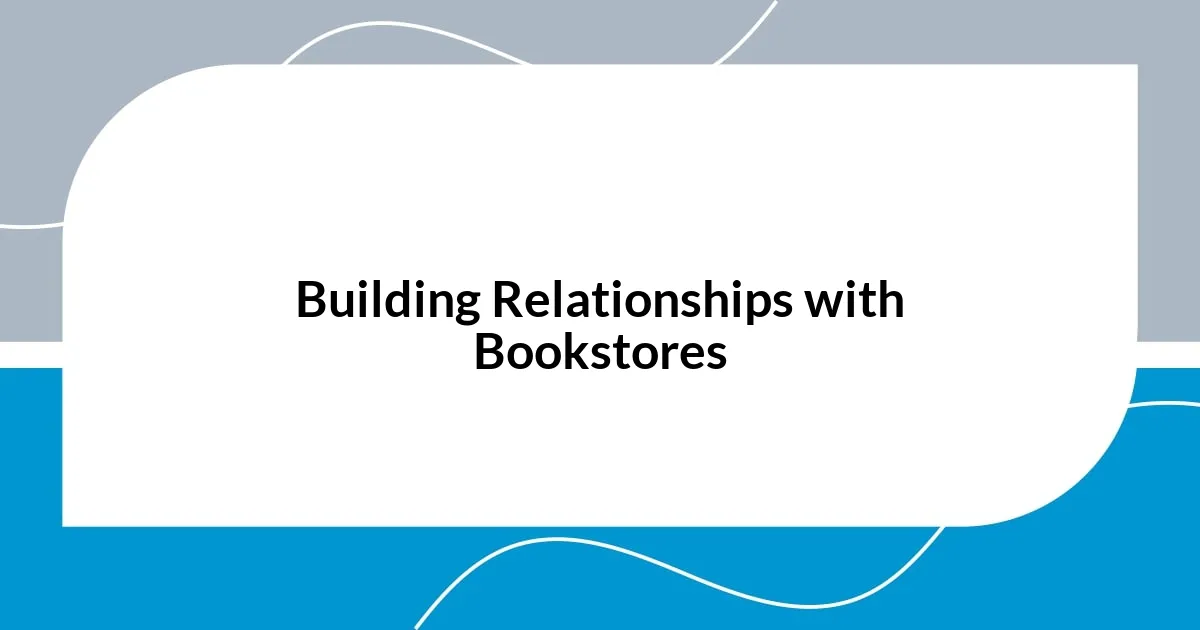
Building Relationships with Bookstores
Building relationships with bookstores is a journey that requires patience and understanding. I recall a time when I spent hours volunteering at a local bookstore, getting to know the staff and the clientele. This not only allowed me to share my passion for books but also created a personal bond that later opened doors for collaborations. It’s amazing how investing time in genuine interactions can lead to long-lasting partnerships.
When I think about what makes these relationships thrive, it often circles back to tailored strategies. For instance, I organized a book club in collaboration with a local bookstore, where we delved deep into themes that resonated with the community. The ripple effect was incredible; not only did it draw in loyal readers, but we also sparked conversations that enriched the local literary landscape. Have you ever thought about how small, thoughtful actions can lead to something monumentally effective?
Navigating the dynamic world of bookstore partnerships is a mix of creativity and adaptability. I once had to pivot an event because of unexpected circumstances, turning a face-to-face gathering into a virtual experience. While challenging, it deepened my connection with both the bookstore staff and customers, showing me that flexibility can lead to newfound opportunities. It’s those moments of resilience that truly solidify relationships.
| Characteristics | Importance |
|---|---|
| Effective Communication | Builds trust and understanding. |
| Shared Goals | Ensures alignment and maximizes benefits for both parties. |
| Community Engagement | Increases visibility and enriches the experience. |
| Flexibility | Enables adaptation to changing circumstances. |
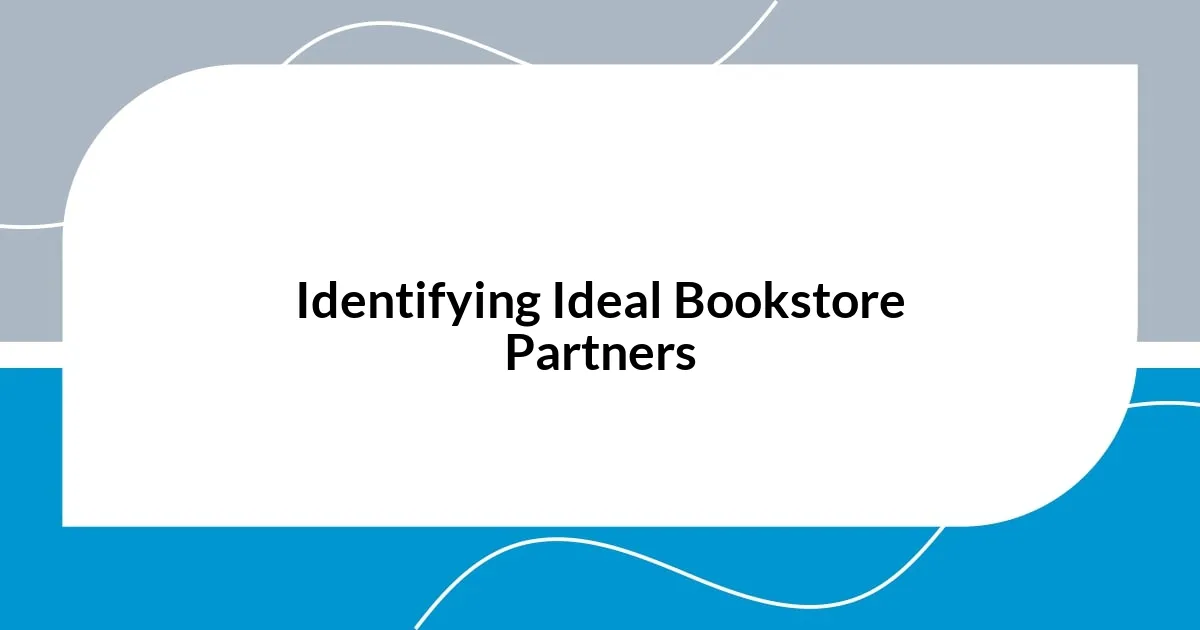
Identifying Ideal Bookstore Partners
Identifying the right bookstore partners involves looking beyond mere business transactions. I remember a particular day when I casually browsed a cozy local bookstore, feeling the palpable warmth of the community. It hit me then that bookstores are much more than retail spaces; they are hubs of culture and connection. Recognizing which bookstores share similar values and missions is crucial for building lasting partnerships.
Here’s a quick checklist to help identify your ideal bookstore partners:
- Community Focus: Is the bookstore involved in local events or initiatives?
- Similar Audience: Do they cater to the same demographic you wish to reach?
- Past Collaborations: Have they worked with authors or brands in ways that aligned with your vision?
- Social Media Presence: Are they active online, providing a platform for marketing efforts?
- Alignment in Values: Do they uphold principles that resonate with your own, like diversity in literature or sustainability?
Engaging with these factors can help you forge connections that are both meaningful and mutually beneficial. Over time, these partnerships can evolve into powerful collaborations that enhance the literary landscape in your community.
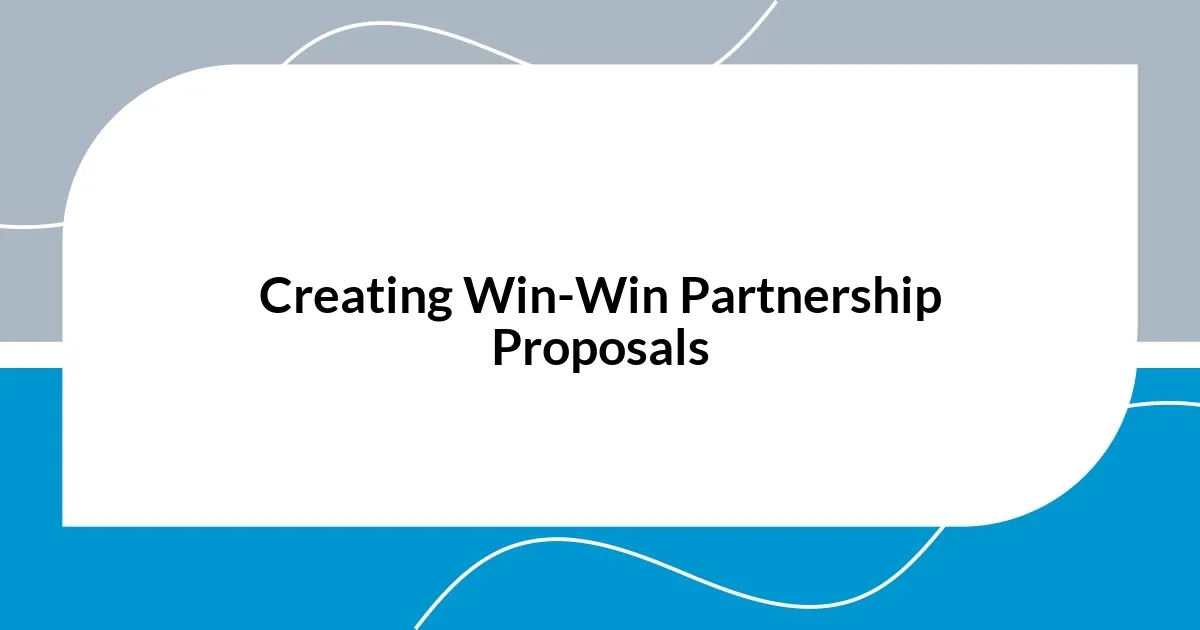
Creating Win-Win Partnership Proposals
Creating win-win partnership proposals hinges on understanding the needs and desires of both parties involved. I learned early on that proposing an idea is not just about what I gain; it’s equally crucial to highlight what the bookstore would benefit from too. For instance, when I approached a local bookstore about hosting a writing workshop, I made sure to emphasize how it could attract new customers and promote their space as a community hub for aspiring authors. Have you ever noticed how a well-rounded proposal feels more like a conversation rather than a transaction?
One element I’ve found immensely helpful is showcasing how the partnership aligns with shared goals. I remember drafting a proposal that connected my upcoming book release with a bookstore’s seasonal reading events. By suggesting a themed celebration, I not only created excitement for my book but also positioned the bookstore as a facilitator of literary fun. This approach ensured that we were both seen as champions of the reading community. Isn’t it fascinating how aligning our visions can elevate a simple proposal into a collaborative celebration?
And let’s not forget the importance of flexibility in these proposals. I once pitched a month-long promotional plan that included a book signing, readings, and a virtual Q&A session. When the bookstore had to adjust due to unforeseen circumstances, instead of pushing back, I adapted quickly. I proposed a hybrid model that encouraged in-store visits while still engaging those online. This adaptability not only strengthened our partnership but also created a memorable experience for everyone involved. Isn’t it rewarding when a partnership proposal evolves into something unexpected yet delightful?
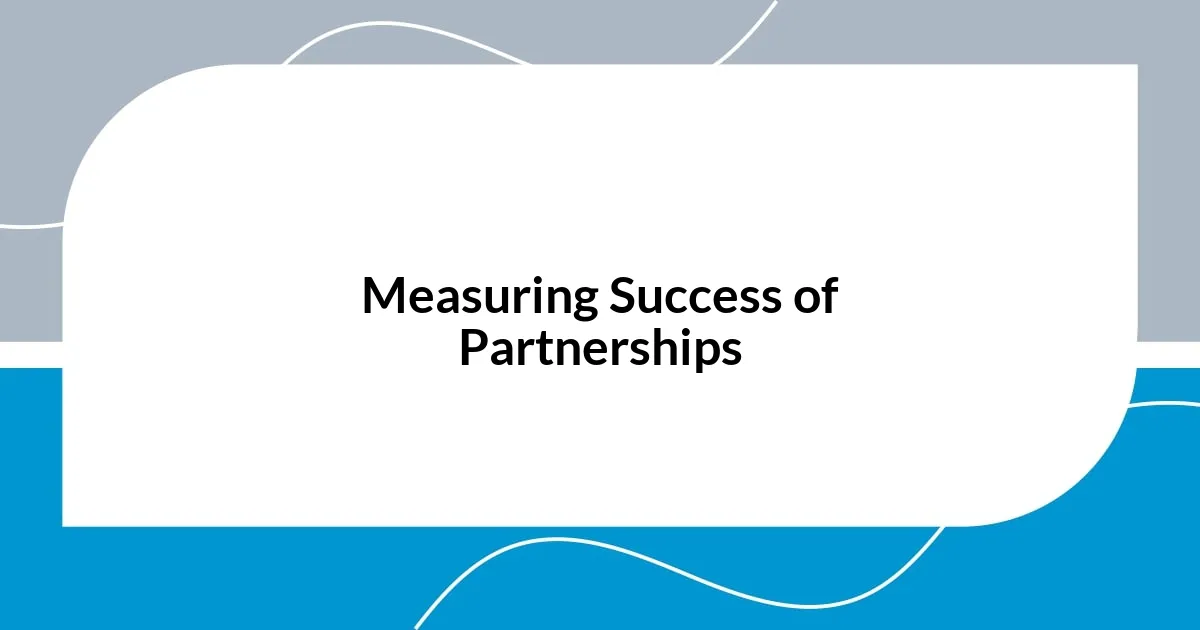
Measuring Success of Partnerships
Measuring the success of partnerships is a nuanced process, one that goes beyond mere sales figures. I recall an instance when I collaborated with a bookstore for a pop-up event. While attendance was modest, the heartfelt conversations I had with attendees made it clear that the engagement and connections we fostered that day were invaluable. How do we gauge success then? By tracking these qualitative insights alongside quantitative data.
Moreover, tracking social media engagement can provide illuminating insights into how our partnership resonates with the community. I remember sharing photos from our event, and the bookstore’s followers began to engage in ways I hadn’t anticipated. Comments and shares soared as attendees reminisced about their experiences and expressed eagerness for future events. This buzz signaled not just a successful partnership, but a growing community interest, which is something I continually aim to cultivate.
Ultimately, I find it vital to set specific goals before embarking on a partnership. For example, during a recent collaboration, we aimed for a 10% increase in newsletter sign-ups through our joint event. Afterward, we reviewed the metrics together, celebrating that we surpassed our goal by 15%. Isn’t it incredible how aligning our goals creates a mutual investment in success? Such milestones deepen the partnership and strengthen the bond between us and our bookstore allies.
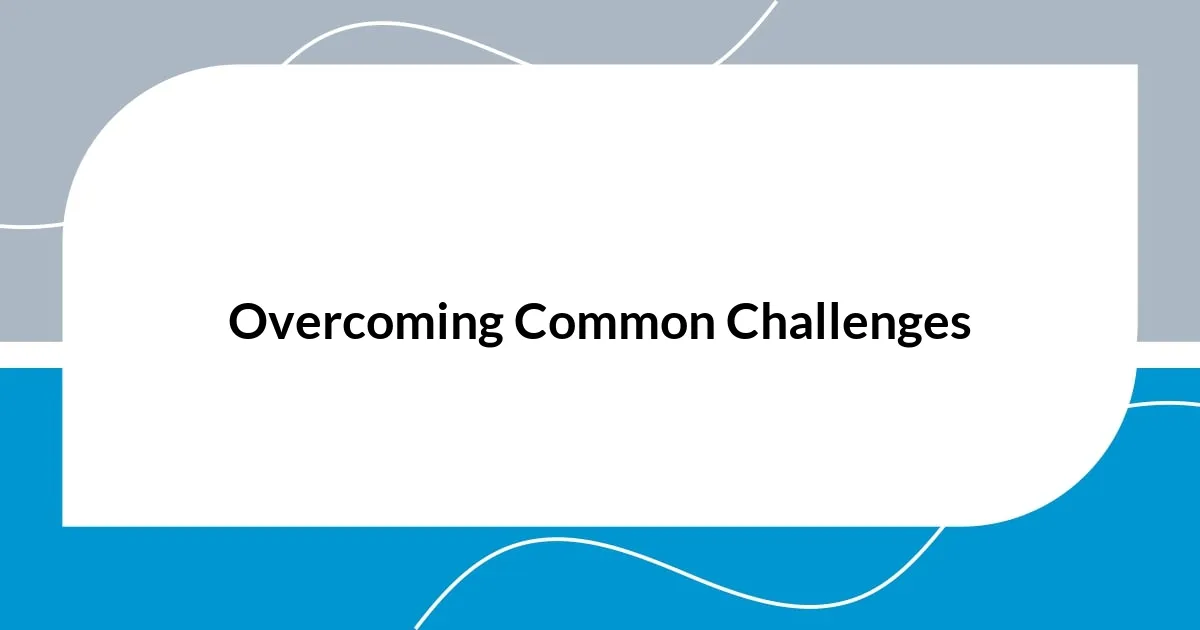
Overcoming Common Challenges
Overcoming challenges in bookstore partnerships often requires proactive communication. In one instance, I faced pushback from a bookstore owner concerned about hosting an event that might compete with other established local gatherings. Instead of getting defensive, I took the time to listen to his concerns and expressed empathy for his situation. Together, we brainstormed an event time that complemented the existing schedule, ensuring everyone felt supported. Isn’t it amazing how just a little understanding can unlock collaborative potential?
Another challenge I’ve encountered is logistical coordination, especially when it comes to marketing efforts. During a joint promotion with a bookstore, we initially struggled with differing branding styles. I suggested we collaborate on a unified graphic and messaging campaign, leading to a cohesive approach that highlighted both our brands. This desire to merge our visions not only resolved the issue but ultimately deepened our creative bond. Have you ever noticed how embracing each other’s strengths can transform a hurdle into a shared victory?
Lastly, unexpected hurdles like changes in inventory or scheduling conflicts can pose significant challenges. I remember one event where the books I planned to showcase arrived late. Instead of panicking, I contacted the bookstore to brainstorm alternatives. We decided to transform the event into a discussion around the value of patience in publishing. We ended up attracting an audience that was genuinely interested in the behind-the-scenes process. Doesn’t it feel empowering when obstacles lead to unexpected opportunities?
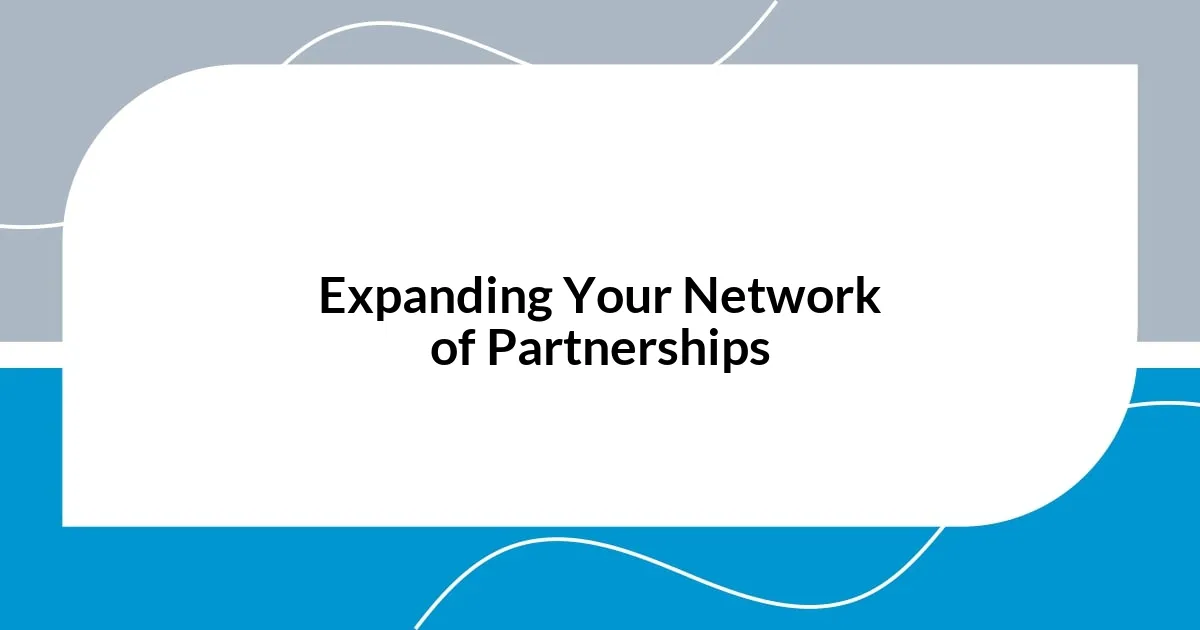
Expanding Your Network of Partnerships
Expanding your network of partnerships can feel like a daunting task, but I’ve discovered it’s about genuine connection. For instance, I attended a local literary festival where I struck up a conversation with an indie publisher. We exchanged ideas, and what started as a casual chat led to a collaborative promotion that benefited both our brands. Isn’t it fascinating how simply being open to conversations can spark opportunities?
Another approach I’ve found effective is leveraging existing relationships. One of my friends runs a book club, and when I asked if they’d be interested in collaborating with a nearby bookstore for their next meeting, the response was overwhelmingly positive. This partnership not only expanded our reach but also brought fresh enthusiasm to our respective audiences. Have you ever considered how your current connections might open doors for new partnerships?
Furthermore, I believe that attending community events plays a pivotal role in nurturing these connections. I recall visiting a poetry reading at a local coffee shop, where I encountered a group of authors eager to promote their work. By simply introducing myself and discussing our mutual interests, I was able to forge relationships that later led to co-hosted readings and joint marketing initiatives. It’s remarkable to think how one spontaneous night can transform into a network of supportive partnerships, don’t you agree?